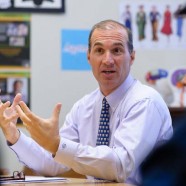
by Todd B. Bland
Every Wednesday morning, I look forward to sitting around the Harkness table with the 14 students in my section of Senior Transitions. This course is designed to help Class I students manage the complexities of senior year and the college admission process, and focus on how to make a smooth and healthy transition from high school to college. Senior Transitions is one of four courses in Milton’s Affective Education program that all students take over their Milton years.
During this year, we focus explicitly on life questions: What makes you happy? What does success look like? Who are you now, and who do you want to become? How does a person lead a good life? These foundational questions, and the answers they prompt, set a context that enables students to make the most of their final year at Milton, of college, and of the world beyond.
Milton students set high expectations for themselves. The same great qualities that brought them to Milton — intellectual curiosity, self-motivation, focus on a passion — can make them particularly vulnerable when realities alter the plan they had envisioned. Sometimes without even knowing it, young people define success by a set of external criteria, and find themselves living lives that they are “supposed to” live, rather than lives they choose.
I am a planner. I believe in setting goals and creating plans to help you realize those goals. I also believe in pausing regularly, to assess, to make sure my goals and plans align with my priorities. Life invariably interrupts even the best-laid plans. Falling in love with my wife at age 18; taking on a job for which I felt woefully under-qualified; having three children in 14 months. My life was irrevocably changed by these events. And I am grateful every day for the friends and mentors who helped me alter my plans and realign myself with a new — exciting, terrifying — set of circumstances.
My students are often subjected to my many “best” pieces of advice. But this one is a gem: Be open to plans that evolve over time. Life comes at you fast, and often you do not know what you know, until you know it. Moving from failure to success; despair to fulfillment; financially strapped to financially capable; illness to health: Navigating those transitions takes grit, courage, flexibility, resilience, and striking out into unknown territory. So many Milton graduates I have met and admire have traveled these pathways.
In his commencement speech to Milton’s Class of 2011, author Reif Larsen ’98 said, “We like plans. But don’t plan too hard. Leave room to be surprised.” I am proud to be part of a School that prepares students to follow paths that they have determined — that helps develop confidence, and courage, and creativity, that helps young people pursue their passions and find authentic, meaningful success, and fulfillment. Our graduates show us, again and again, that Milton fosters and supports this thoughtful way of leading a life.



